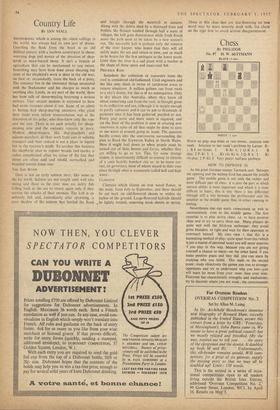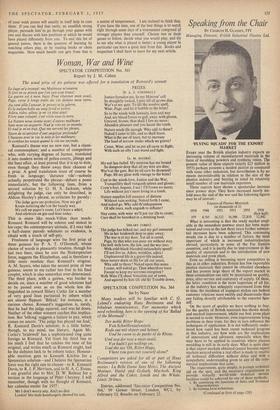Chess
BY PHILIDOR No. 87 H. W. BETTMANN
BLACK (5 men, WHITE to play and mate in two moves. solution next week. Solution to Iasi week's problem by Larsen R- B 8, no threat. I B-Kt 4; 2 Q-K 6. I .8 else; 2 P-Kt 3. 1 ... Kt (41-Kt 6: 2 Q-R . Kt (41 else: 2 P-Kt 3. Very pretty half-pin problem
HOW TO IMPROVE (3)
As the great German master Tarrasch said 'Between the opening and the ending God has placed the middle game ' The middle game is not only the richest and most difficult part of chess it is also the part in which natural ability is most important and which it is most difficult to learn; this is why there. Is less difference (though still a lot) between the professional and the amateur in the middle game than in either opening or ending. Nevertheless one can learn. consciously. as well as unconsciously. even in the middle game. The first essential is to play active chess. i.e. to have positive ideas and to try to carry them out. Many players do quite well with the Sitzkrieg technique: they avoid gross blunders. sit tight and wait for their opponent to overreach himself. My own view s that this is a nauseating method of play; quite apart from this (which is just a matter of personal taste) you will never improve If you play in this way, because you are not giving yourself a chance to learn—on the other hand, if you make positive plans and they fail. you can learn by studying why you failed. This leads to the second point: study objectively the games you lose to strange' opponents and try to understand why you lost—you will learn far more from your •osses than your wins. Everyone has characteristic, strengths and weaknesses; try to discover where you are weak:. the consciousness
of your weak points will usually in itself help to cure them. If you can find that rarity, an unselfish strong player, persuade him'to go through your games with you and discuss with him positions at which he would have played differently from you. To end this list of general points, there is the question of learning by watching others play, or by reading books or chess magazines. How much benefit one gets from that is a matter of temperament. I am inclined to think that, if you have the time, one of the best things is to watch right through some days of a tournament composed of stronger players than yourself. Choose two or three games to follow, decide what you would play, and try to see why what is played is better; a young player In particular can learn a great deal from this. Books and magazines I shall have to leave for my next article.



































 Previous page
Previous page